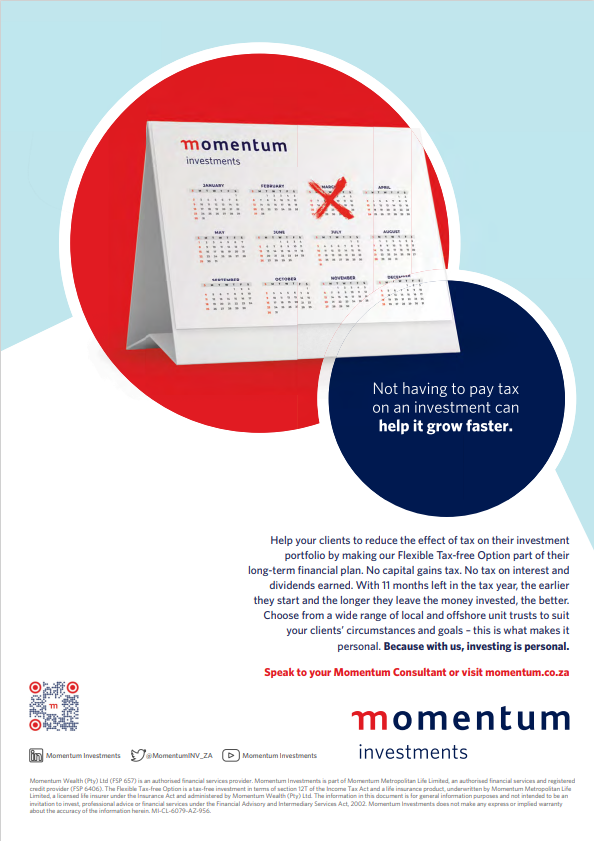Johan Kleu – Executive Head, Momentum Multiply

Marketing has always been grounded in data. Historically though, it has been more often led by gut instinct than objectively attuned and intelligent insights wrought by sophisticated digital tools. With this gut instinct, and whatever wisdom we could muster, it was difficult to get granular details on the performance of a campaign or even a product.
Even though we were already living in a digital information age, the pandemic disrupted the natural evolution as customers basically changed their buying habits overnight. The journey from prospect to purchase became overwhelmingly digital and self-directed, and customer expectations increased.
This digital explosion has led to a torrent of data being generated. Although we were always on track to become more reliant on a data-driven bottom line, new data collection and analysis tools have created an exponential amount of data to sift through.
Through the right business intelligence and analytics tools, it is possible to slice and dice your customer’s choices and behaviours to get extremely valuable insights. But, like all tools, it can be used, abused and completely misunderstood. It is up to the business to make the right data-driven decision.
It starts with remembering who we are.
All businesses need to acknowledge that, at the end of the day, we are all human, so all practices relating to data should be created from a human-centric foundation. Developing a strategy and product that puts customers (people) at the heart of a data strategy is essential for making informed decisions. The objective here would be to not only drive efficiencies but also improve customer satisfaction and brand trust.
At Momentum Multiply, we deal with a particular wealth of data that our customers have entrusted us with. This data is personal and pertains to information surrounding wellness activities like age, weight, and personal financial information. It is our responsibility to use it in a way that both enriches the customer and the business without crossing any lines that could be misconstrued as morally unethical. We’ve seen with the introduction of the Protection of Personal Information Act (POPIA), morality has been made manifest as underlying ethics surrounding data became legally entrenched into daily business practices. Now it is imperative that businesses safeguard and ensure secure use of customer data. But we shouldn’t always need laws to help us determine between right and wrong.
Personal and behavioural data should be used to reward through positive reinforcement. There is a big difference between nudging your customer in a positive direction and manipulating them for your own gain.
For instance, at Multiply, we reward our members for accomplishing weekly challenges by providing incentives in our Weekly Wins programme. These challenges get harder over time, but that only means our members are getting fitter – which is worth rewarding.
As we track the progress of our members, we are able to segment them for greater business intelligence by then offering products, rewards and solutions that cater to their unique needs or challenges. By putting data at the centre of our communication and reward platforms, we can nudge our members in the right direction – one that is good for them and for our bottom line.
This is the essence of what is known as ‘Nudge Theory’. This Nobel-prize winning idea was coined in 2008 by economist Richard Thaler to explain how to “nudge” people to make decisions that can be difficult but benefit them in the long term.
By having access to data, businesses are in a prime position to use this theory to the benefit of their consumers. However, access to data still requires an inherent moral compass to nudge in the right direction. So, it can still be used for more sinister goals and consumers need to be aware of this.
An infamous example of this is when Cambridge Analytica was caught using personal data from users in a bid to provide analytical assistance to sway an important National election in favour of Donald Trump.
In the end, the idea of nudging consumers by using their wilfully shared data is neither a good nor bad strategy. It all depends on the direction in which they are being nudged and whether it meets the criteria of working for them and your business objectives. It only requires a simple moral foundation to ensure that you are not nudging them in a way that only rewards you, which can be viewed as unethical and exploitative. Always ask yourself: what’s in it for me, and what’s in it for them? If both of those questions don’t have a positive answer, it’s most likely not worth the risk.
Exploiting personal information in the name of product development and marketing is unethical and doesn’t lead to a good relationship with customers. This is a recipe for failure. When the truth comes out, which it always does, your brand (and the people who work so hard to make it succeed) will suffer the consequences. Always remember that data and insights can be used to turn consumers into human beings. What’s good for them should be good for you.
So, in the end, data can and should be used to add value to both the customer and the business on a very human level. It all depends on which direction you are willing to nudge.


